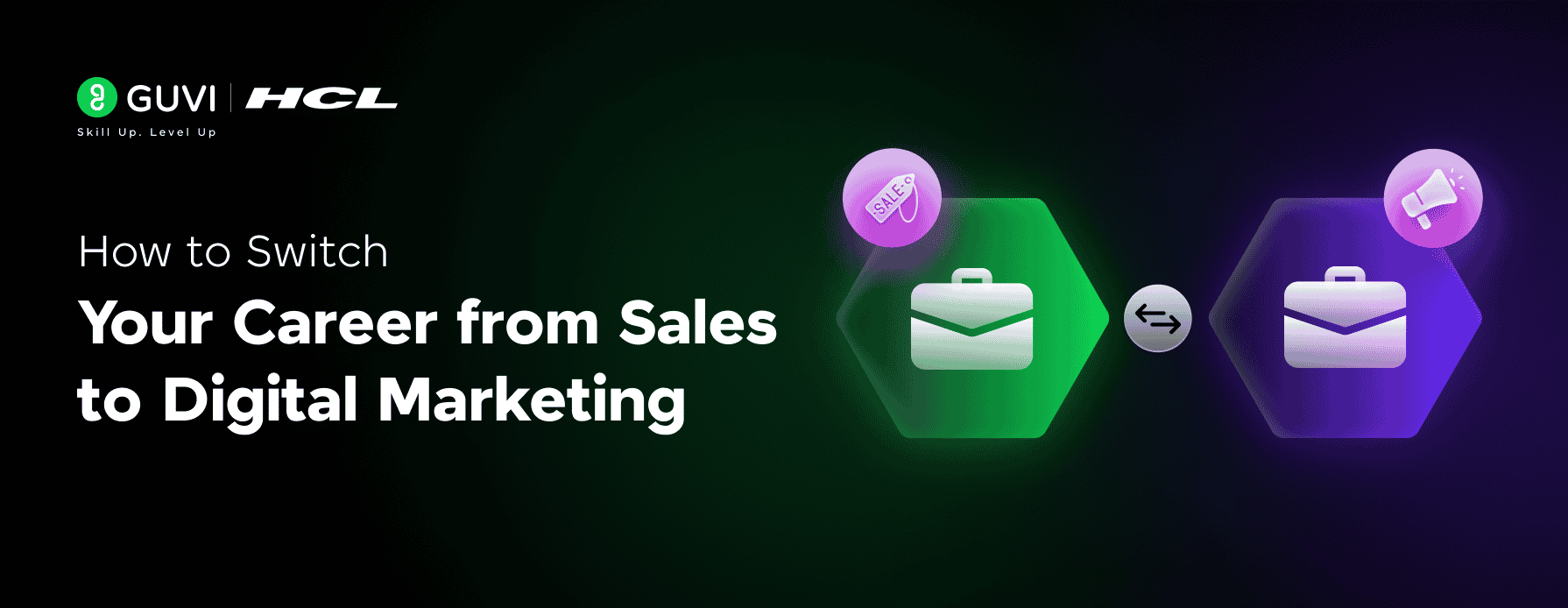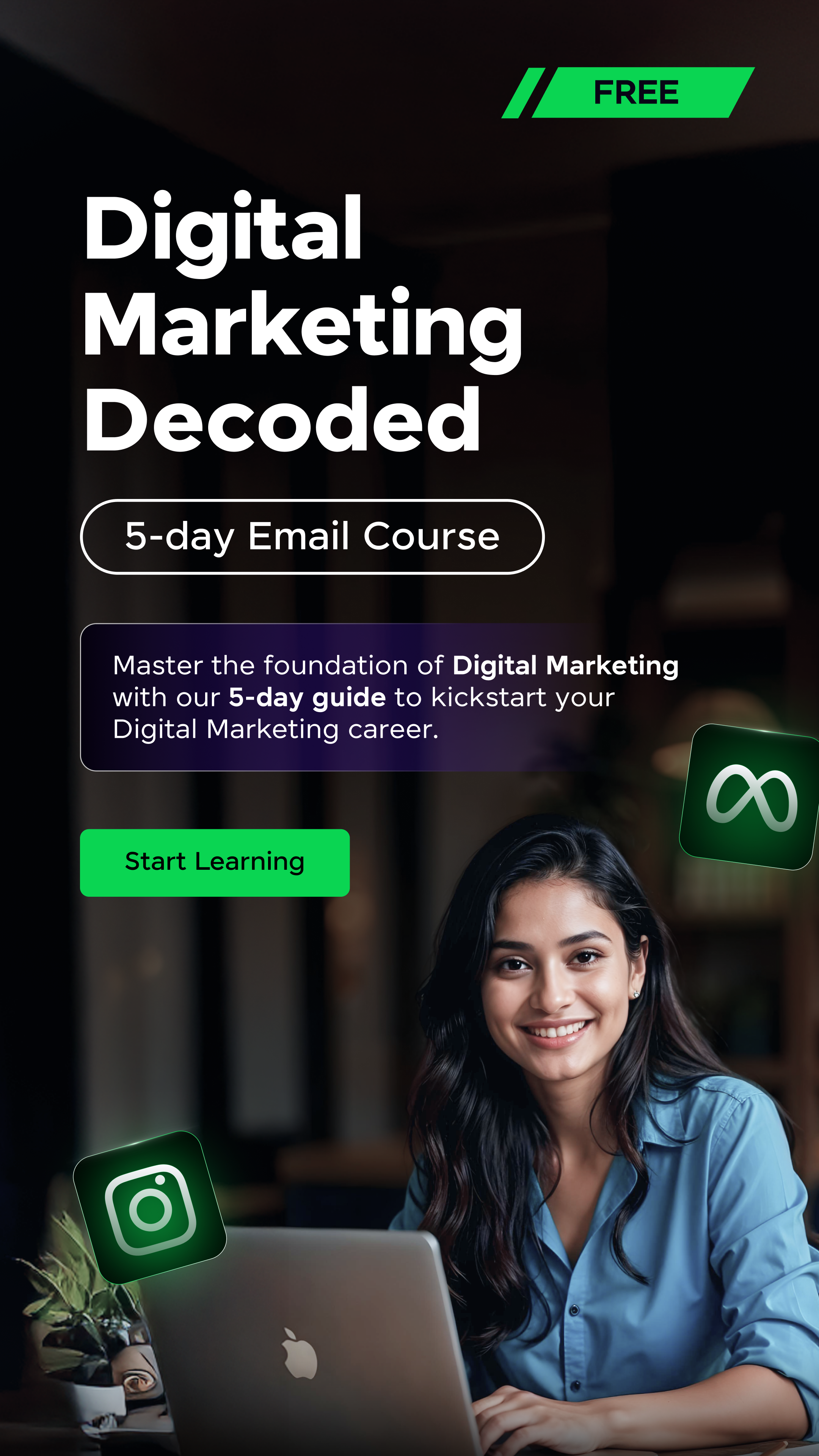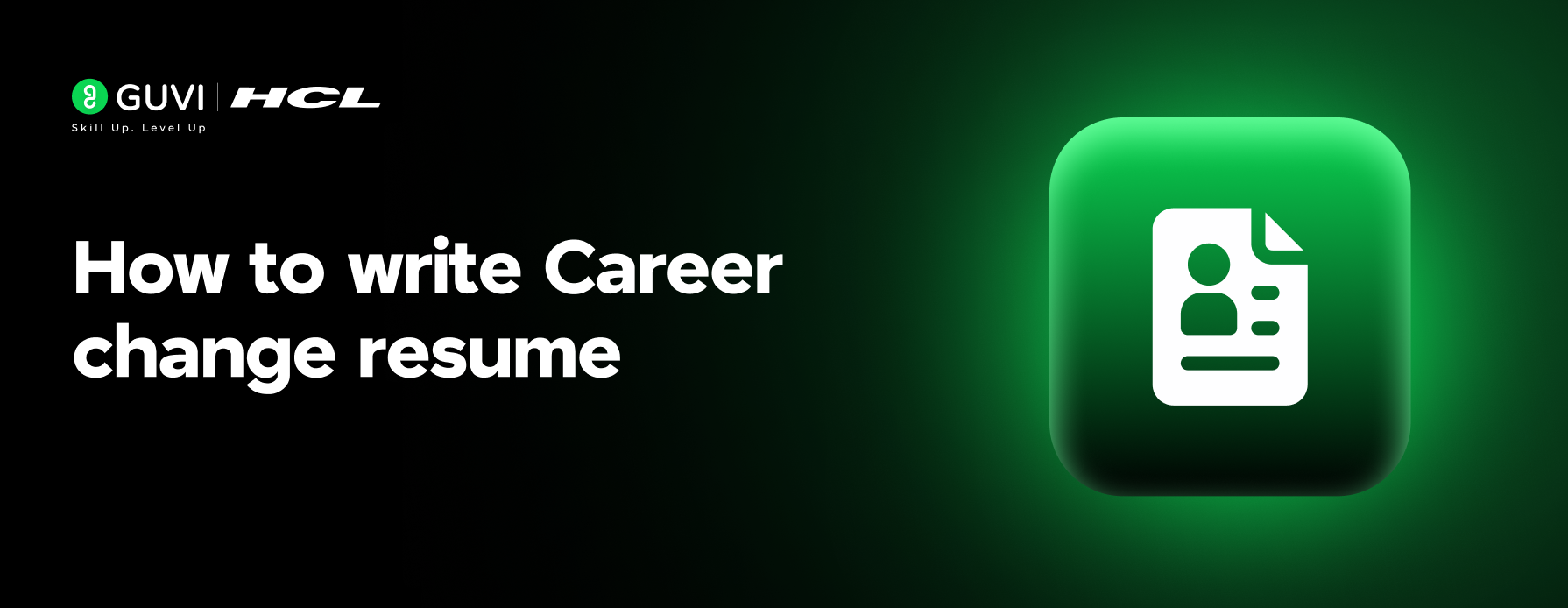
How to Switch from Sales to Digital Marketing: A Beginner’s Guide [2025]
Oct 13, 2025 6 Min Read 4675 Views
(Last Updated)
Are you tired of meeting those sales quotasf with not much incentive? You also just feel stuck in your sales gig with no way to climb higher? Well, then it’s time for a career change! One that won’t just take you to better places but also comes with great pay.
Your marketing move will open up great possibilities, particularly in India. New digital marketers start earning ₹3-4.5 LPA and can reach ₹8-12 LPA within 5-6 years. Quite the promotion, isn’t it? But it’s not that simple to make this switch, especially when you don’t have someone to guide you, and the internet is just filled with all kinds of information.
But you don’t need to worry because I’ll show you how to make this career switch work. This article breaks down everything you need to know – from using your current skills to landing your first marketing job. The steps are simple and practical for beginners. Let’s begin!
Table of contents
- A Step-by-Step Guide on How to Switch from Sales to Digital Marketing
- Step 1) Understanding the shift from sales to digital marketing
- Step 2) Mapping your sales skills to marketing roles
- Step 3) Choosing your digital marketing path
- Step 4) Top Courses and Certifications to boost your knowledge and credibility
- Step 5) Building your first marketing portfolio
- Step 6) Updating your resume and LinkedIn profile
- Step 7) Finding your first digital marketing job
- Concluding Thoughts…
- FAQs
- Q1. Is digital marketing a viable career option in 2025?
- Q2. How can I transition from a sales role to digital marketing?
- Q3. What are the first steps to start a career in digital marketing as a beginner?
- Q4. Which digital marketing skills are most valuable for newcomers?
A Step-by-Step Guide on How to Switch from Sales to Digital Marketing
Now, we will be discussing the steps you must follow in order to switch from sales to digital marketing with ease and confidence. What you will need the most during this whole process is discipline, so do follow along with consistency. Good Luck!
Step 1) Understanding the shift from sales to digital marketing
Moving from sales to digital marketing offers an exciting development rather than a complete career change. Your sales background gives you valuable skills that build a strong foundation for success in digital marketing. Many of the skills you’ve built in sales—like communication, persuasion, and understanding customer pain points—translate very well into the digital marketing space.
Reasons Why This Shift Makes Sense:
- Transferable Skills: Your ability to understand customer psychology, handle objections, and close deals will help you create better-performing marketing campaigns.
- Wider Career Scope: Digital marketing offers diverse roles—SEO Specialist, Content Marketer, Email Campaign Manager, Social Media Strategist—each with room for growth.
- Demand and Flexibility: In 2025, digital marketing is among the top in-demand skill sets globally, with opportunities for remote work, freelancing, and entrepreneurship.
- Data-Driven Environment: If you enjoy working with targets and metrics in sales, you’ll appreciate the data-backed decision-making in digital marketing tools like Google Analytics, CRM systems, and A/B testing platforms.
- Creative Freedom: While sales can feel repetitive, digital marketing allows you to experiment with visuals, content, storytelling, and trends to engage your audience.
Step 2) Mapping your sales skills to marketing roles
Your sales experience is a treasure trove of skills you can use to push your digital marketing career forward. The transition from sales to marketing builds on what you already know. It opens new creative and analytical paths without starting over.
The key lies in understanding how your current competencies align with marketing responsibilities—and leveraging that alignment to make a smoother, more confident switch. This helps you utilize your strengths and develop new skills that match your career goals.
- Customer Understanding → Audience Targeting: In sales, you’ve developed a deep understanding of customer pain points, buying behaviors, and motivations. These insights are crucial in digital marketing, especially when building buyer personas, segmenting audiences, and crafting targeted campaigns.
- Communication & Persuasion → Content Creation & Copywriting: Salespeople are trained communicators. You know how to pitch, handle objections, and close deals. These communication skills are invaluable in marketing, particularly in copywriting, email marketing, and content marketing, where the goal is to persuade and convert.
- Relationship Building → Social Media & CRM Engagement: Strong interpersonal skills and long-term relationship-building are hallmarks of great salespeople. These are also key in social media marketing, influencer outreach, and customer retention marketing, where interaction and engagement drive loyalty.
- Goal Orientation → Campaign Management: Sales professionals work toward specific quotas and KPIs. This results-oriented mindset fits perfectly with campaign planning and performance marketing, where tracking ROI and optimizing performance is critical.
- Product Knowledge → Value Proposition & Positioning: In sales, you learn to position a product’s value clearly and effectively. This ability is directly applicable in brand positioning, product marketing, and content strategy, where the focus is to communicate the unique benefits of a product or service.
Step 3) Choosing your digital marketing path
Digital marketing provides several specialization paths that line up with your sales expertise. Your transition from sales to marketing becomes smoother when you pick the right path early.
These are some of the paths you must consider:
- Search Engine Optimization (SEO): Ideal for detail-oriented professionals who enjoy analyzing data and improving visibility on search engines. SEO focuses on organic traffic growth and understanding algorithms.
- Content Marketing: Great for those with a flair for storytelling and writing. It involves creating blogs, articles, videos, and infographics to attract and engage a target audience.
- Social Media Marketing: Perfect for individuals who understand audience engagement and have a knack for building communities. It includes managing social media platforms, creating content, and running ads.
- Performance Marketing (PPC/SEM): Best suited for analytical thinkers. It involves managing paid campaigns on platforms like Google Ads or Facebook Ads and optimizing for ROI.
- Email Marketing: Ideal for professionals who are good at crafting messages and segmenting audiences. It involves sending newsletters, drip campaigns, and personalized content to convert leads.
Learning the essential digital marketing skills
Your next step after choosing your digital marketing path is to become skilled in essential digital marketing skills. Two simple skill areas need immediate attention if you’re moving from sales to digital marketing: SEO and email marketing. These skills will help you build credibility fast in your new career. I’ve put them in a table for your better understanding:
| Skills | What You’ll Learn | Why It’s Important | Tools to Explore |
| 1) Digital Marketing Basics | Marketing funnels, customer journey, personas, inbound vs. outbound marketing | Helps you understand the overall framework and user behavior | Google Digital Garage, Coursera, HubSpot |
| 2) SEO (Search Engine Optimization) | Keyword research, content optimization, on-page SEO, link building | Improves website visibility and drives organic traffic | Google Search Console, Ahrefs, SEMrush |
| 3) SEM (Search Engine Marketing) | Google Ads setup, keyword targeting, bidding strategies, ad copywriting | Drives high-intent traffic using paid ads | Google Ads, Ubersuggest |
| 4) Social Media Marketing | Content creation, audience targeting, ad campaigns, influencer outreach | Enhances brand visibility and audience engagement | Meta Business Suite, Hootsuite, Buffer |
| 5) Content Marketing | Blogging, storytelling, content strategy, visual content | Attracts, educates, and converts prospects | Canva, WordPress, Grammarly |
| 6) Email Marketing | List building, campaign automation, segmentation, performance analysis | Supports lead nurturing and customer retention | Mailchimp, ConvertKit, Sendinblue |
| 7) Analytics & Data | Google Analytics 4, tracking user behavior, A/B testing, reporting | Helps you measure ROI and optimize campaigns | Google Analytics, Hotjar, Tag Manager |
| 8) Marketing Automation | Workflow creation, personalization, and customer lifecycle campaigns | Automates repetitive tasks and improves scalability | HubSpot, ActiveCampaign, Zoho MarketingHub |
Step 4) Top Courses and Certifications to boost your knowledge and credibility
Professional certifications prove your skills effectively when moving from sales to digital marketing. Employers actively seek credentials that show your dedication to learning digital marketing basics, even without direct field experience. Let’s discuss the top 3 programs:
1) Google Digital Marketing Certificate: Offered through Coursera, this beginner-friendly program by Google provides a strong foundation in digital marketing concepts. It covers the fundamentals of search engine optimization (SEO), social media marketing, email campaigns, and analytics, making it ideal for sales professionals who want to get familiar with the digital landscape.
2) HCL GUVI’s Digital Marketing Course: This is a mentor-led, career-focused digital marketing program designed for freshers and career switchers. Tailored for learners from non-marketing backgrounds, it offers end-to-end training in the latest marketing tools, campaign creation, and data-driven decision-making.
3) HubSpot Academy’s Digital Marketing Certification: HubSpot’s free certification is a great introduction to inbound marketing and content creation. As a sales professional, you’ll find the concepts of customer journeys and lead nurturing familiar and easy to connect with your past experiences.
Courses and Certifications seem too complex for you right now? Well then, you’re in for a treat because our latest Digital Marketing e-book is the perfect resource to help you get started.
Step 5) Building your first marketing portfolio
A digital marketing portfolio stands as proof of your new digital marketing skills. It lets potential employers see your capabilities instead of just reading about them. As the quote goes, “While a resume tells the world what you do, a portfolio shows how you do it.”
Let’s discuss how you can show it:
1. Understand What a Marketing Portfolio Is: A marketing portfolio is a digital or physical collection of your work that highlights your marketing skills and experience. It includes campaigns you’ve worked on, content you’ve created, metrics you’ve achieved, and tools you’ve used.
2. Start with Simulated or Self-Initiated Projects: Even if you’re new to marketing, you can start building your portfolio by creating your projects. These show initiative and help you apply your knowledge practically. Recruiters want to see your ability to strategize, execute, and analyze results, not just theoretical knowledge.
3. Use Freelance and Volunteer Work to Gain Real Experience: If you want real-world examples, consider offering your services for free or at a discounted rate. Even small wins (like growing an Instagram account from 200 to 1,000 followers) count when documented clearly.
4. Showcase Results with Data and Insights: Your portfolio shouldn’t just include visuals or descriptions—it should highlight outcomes. Use basic analytics to demonstrate the success of your efforts.
5. Build a Simple Portfolio Website: Once you have content, organize it neatly on a personal portfolio site. You don’t need to be a web designer—free tools like Wix, WordPress, or Notion can help. This gives recruiters a centralized place to view your work and reach out.
6. Keep Updating Your Portfolio: Digital marketing is constantly evolving, and so should your portfolio. As you learn new skills, complete projects, or earn certifications, add them.
Step 6) Updating your resume and LinkedIn profile
Your professional experience needs the right positioning for digital marketing roles. A strategic update of your resume and LinkedIn profile will help you catch marketing recruiters’ attention.
1. Customize Your Resume for Digital Marketing Roles: Your resume should reflect your intent to move into digital marketing, and not just your sales history. You need to show recruiters that you understand the basics of digital marketing and that your sales experience gives you a strong foundation.
2. Reframe Sales Experience as Marketing-Relevant: Your experience in sales isn’t irrelevant—it’s just a matter of language. You need to connect your past work to marketing goals. This helps recruiters see how you already think like a marketer.
3. Update Your LinkedIn Profile: LinkedIn isn’t just an online resume—it’s also a searchable platform where recruiters actively find candidates. Your goal is to make it easy for them to find you when they search for digital marketing talent.
4. Showcase Personal Projects or Freelance Work: Even if you haven’t worked professionally in digital marketing yet, you can still show that you’re gaining hands-on experience. This shows initiative and gives hiring managers confidence that you’re not just learning—you’re applying.
5. Ask for Skill-Based Recommendations: Request LinkedIn recommendations from former colleagues or clients that speak to your relevant skills like communication, analytical thinking, or problem-solving—traits crucial to digital marketers.
Step 7) Finding your first digital marketing job
Landing your first digital marketing position celebrates all your preparation efforts. Your skills are developed, certifications earned, and portfolio ready. Now you can approach the job market with a solid search plan. Here are the five most common digital marketing roles suitable for beginners, especially those transitioning from a sales background:
| Role | Key Responsibilities | Entry-Level Salary (India, 2025) |
| 1. Digital Marketing Executive | Manage campaigns across channels (SEO, SEM, email, social); analyze performance metrics. | ₹3 – ₹4.5 LPA |
| 2. Social Media Marketing Associate | Create, schedule, and analyze content across platforms like Instagram, Facebook, LinkedIn. | ₹2.8 – ₹4.2 LPA |
| 3. SEO Analyst | Create, schedule, and analyze content across platforms like Instagram, Facebook, and LinkedIn. | ₹3 – ₹4 LPA |
| 4. Content Marketing Executive | Write blog posts, web content, and digital copy; collaborate with SEO and social teams. | ₹3 – ₹5 LPA |
| 5. Performance Marketing Associate | Run paid ad campaigns (Google Ads, Meta Ads); track ROI and conversion rates. | ₹4 – ₹6 LPA |
Concluding Thoughts…
I think we can all agree that digital marketing provides a natural career progression from sales that builds on your current expertise. Your sales background equips you with valuable skills to understand customers, analyze data, and communicate strategically – everything you need for marketing success.
Pick a specialization that aligns with your strengths, complete essential certifications, and create your portfolio today. Employers highly value the powerful combination of your sales experience and new marketing capabilities.
Do follow along the steps closely and reach out to us through the comments section if you have any doubts.
FAQs
Q1. Is digital marketing a viable career option in 2025?
Digital marketing remains an excellent career choice in 2025, with strong demand for skilled professionals. Companies are increasingly seeking experts who can enhance their online visibility and improve client engagement, making it a field with abundant opportunities for growth.
Q2. How can I transition from a sales role to digital marketing?
Transitioning from sales to digital marketing is achievable by leveraging your existing skills. Start by learning digital marketing fundamentals, gaining certifications, and building a portfolio of projects. Your sales experience in customer communication and data analysis provides a strong foundation for marketing roles.
Q3. What are the first steps to start a career in digital marketing as a beginner?
To begin a career in digital marketing, focus on learning the basics through online courses and resources. Familiarize yourself with key areas like SEO, social media marketing, and content creation. Build practical skills by working on personal projects or volunteering for small businesses to gain hands-on experience.
Q4. Which digital marketing skills are most valuable for newcomers?
For those new to digital marketing, essential skills include search engine optimization (SEO), social media management, content creation, and basic data analysis. Familiarity with tools like Google Analytics and popular social media platforms is also crucial. Start by mastering these foundational skills before specializing further.




































Did you enjoy this article?